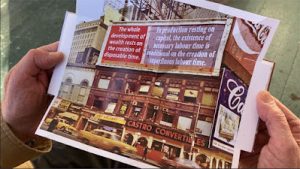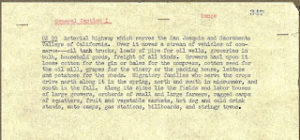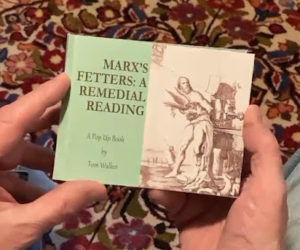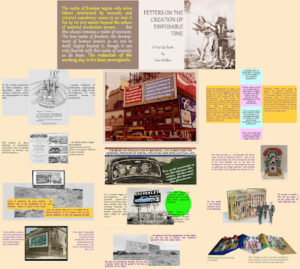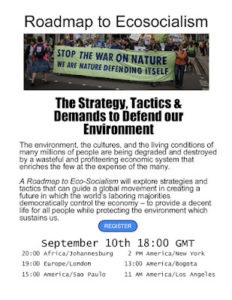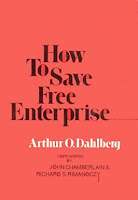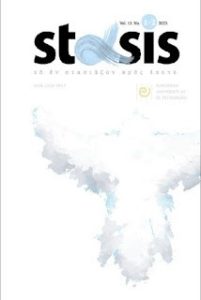At the Columbia Center for Contemporary Critical Thought Marx 9/13 session on the Grundrisse last night, I asked a question from Zoom that cannot be heard on the Youtube video because of technical difficulties. I will try to reconstruct the jist of the question here along with a bit of context. I apologize if the reconstruction of my question is a bit more coherent than the original, which was made unintelligable by a time delay and apparent distractions in the audience.In his presentation, Michael Hardt spoke about the Italian Autonomists’ "refusal of work" strategy that Antonio Negri articulated in his book, Marx Beyond Marx. In talking about how the strategy related to the Grundrisse, Hardt referred to a parenthetical passage where Marx talked about "the worker’s participation in the
Read More »Articles by Sandwichman
The Theory of Crisis: Sandwichman’s and Uno Kōzō’s (both Marx’s)
February 25, 2025Just what is it that makes Marx’s contribution so different, so appealing?Marx revealed the dark secret of classical political economy: that the writers in that tradition assumed the ubiquity of a distinctive economic sphere that was, in fact, unique to and characteristic of capital. To them capitalism was eternal and earlier forms of society were simply incomplete in their striving toward the absolute. By breaking with that tradition, Marx was able to more completely grasp the dynamic of capital accumulation and crisis.Marx had a theory of crisis and of the dynamics of capital accumulation already in the late 1840s but his mature theory hinges on the distinction between labour and labour power or capacity that he didn’t develop until the next decade. When his "Wage Labour and Capital"
Read More »The Theory of Crisis: Kōzō Uno’s and Sandwichman’s
February 23, 2025Every few days I check my dormant eX-twitter account to see if there were any replies to old posts. A great series of questions showed up a couple of days ago.Neon Nova asks:Sandwichmann, would you consider yourself a follower of Dilke? What does Marx offer that Dilke doesn’t? I know Marx revisits some of Dilke’s ideas on leisure time, but do you think there are flaws in Marx’s approach? Does Dilke ultimately surpass Marx in your view?I’ve noticed you’ve traced Dilke’s views on leisure time back to Godwin, and Godwin’s ideas to Calvinism. But if Marx’s "great ideas" are merely a rehash of Dilke or Godwin’s thoughts, what makes Marx’s contributions unique or great?Yes, I would consider myself a follower of Dilke and of Godwin, in that they initiated a discourse that had greater theoretical
Read More »Hot off the press… and cut… and fold… and glue. It’s Amazing!
February 6, 2025“It’s amazing.”“It’s incredible!”“Cool!”“Best book of 2024.”“This is an amazing and unique work of art.”“Your book is a thing of beauty and will be my joy forever. There’s something wonderful about a pop-up book in 2025.”“Excellent, Tom. Brilliant way to bring the text to life. Well done (as always)!”“It is not only beautiful and ingenious but itself a theoretical contribution.”“It’s amazing, a lot of work!”“I love it! What a creative and penetrating way to communicate Marx’s core message.”“I have just received your most interesting and delightful pop-up book. … I will study it carefully.”“I really appreciate your book-art, a remarkable form of critique and practice at the same time.”“Amazing pop up book: I love it!”“It’s great. I really like the way you brought together the ideas about
Read More »On the politics that would make a post-growth transition possible
January 30, 2025To the co-authors of “Post-growth: the science of wellbeing within planetary boundaries,” published in The Lancet Planetary Health:Thank you so much for the valuable work you have all done surveying the field of post-growth research. In the conclusion of your article, you observe "…we still know little about the politics that could make post-growth transitions possible in reality." I would like to address that issue here. While I don’t presume to have all the answers, I believe I can help identify some of the most urgent questions.There are several references to work-time reduction and one mention of leisure in the article. Leisure is mentioned, however, only as one item in a list of domains of life in a post-growth world. The references to work-time reduction are instrumental and
Read More »A thing of beauty is a joy forever
January 8, 2025Above, from On Biblical Subjects, by Robert Dodsley, a lift the flap illustrated manuscript circa 1720 (sold for £20,000 in 2021). Robert Dodsley’s son – also named Robert Dodsley – published a volume of "Old English Plays" in 1744. In 1816, Charles Wentworth Dilke published volume two of his Old Plays, being a continuation of Dodsley’s collection. Rodwell and Martin on Bond Street was the publisher. They also published Dilke’s The Source and Remedy of the National Difficulties, deduced from principles of political economy, in a Letter to Lord John Russell. Included in volume two of Dilke’s Old Plays was "Endymion; or, The man in the moon," a comedy by John Lyly. Two years later, Dilke’s dear friend and neighbour, John Keats published his poem, "Endymion," the famous first line of which
Read More »Klaus Fuchs, Max Beer, and Our Anonymous Pamphleteer
December 23, 2024Klaus Fuchs makes only a cameo appearance in this tale. But because he is far better known than Jürgen Kuczynski, his relationship to the latter helps establish the milieu in which our main character operated.Fuchs is routinely referred to pejoratively as a "spy" who "stole" atomic secrets. A more nuanced view of his activities was offered by Sir Dick Goldsmith White, Director General of MI5 from 1953 to 1956, and Head of MI6 from 1956 to 1968: "He was a scientist who got cross at the Anglo-American ploy in withholding vital information from an ally fighting a common enemy."In 1942, Fuchs met with Jürgen Kuczynski, who was then teaching at the London School of Economics. Kuczynski introduced him to the Soviet agent, Simon Kremer (codename: "Alexander"). After meeting with Kremer several
Read More »The more this contradiction develops…
December 18, 2024The more this contradiction develops, the more does it become evident that the growth of the forces of production can no longer be bound up with the appropriation of alien labour, but that the mass of workers must themselves appropriate their own surplus labour.
Read More »Behind the Billboards
December 13, 2024IMOGEN CUNNINGHAM: Roi had to restrain himself on art because after the birth of the twins he was at Foster and Kleiser, billboard advertising. Because they knew that I had a camera and was a photographer, they asked him to do billboards. You know, to go out and photograph them. He did very good shots. And all I could see of it was from Twin Peaks. He would tell me in what direction the light was. I guessed at the exposure. He did it on 4 x 7 film and he did a darned good job. He took it downtown to a place for development. One day he came home and said, "You know, there’s a new girl at Marshios now, and she comes halfway across the counter." Guess who that was. Dorthea [sic] Lange. And we became acquainted with Dorthea Lange. He then introduced Dorthea to Maynard Dixon, who was also at
Read More »The Book is Not for Selling.
November 27, 2024"This is an amazing and unique work of art." – Martin Nicolaus.I had my first inquiry from someone who wanted to buy a copy of my new pop-up book. This presented me with a dilemma because I had never intended to sell copies of the book. The rationale for not selling appears in the book – on pages eight and eleven. The nature of capital is that "real wealth must take on a specific form distinct from itself, absolutely not identical with it, in order to become an object of production at all." And……real wealth is the developed productive power of all individuals. The measure of wealth is then not any longer, in any way, labour time, but rather disposable time.Real wealth thus cannot be measured in money. Any price I attached to the book would be arbitrary. Why not $62,885,000? "But you
Read More »The more the contradition develops: footnotes to “Marx’s Fetters: a remedial reading” — a pop-up book
November 11, 2024Last June, I posted a book proposal to EconoSpeak: Marx’s Fetters and the Realm of Freedom: a remedial reading. It was a lightly revised version of a proposal that I had earlier sent to two publishers who had rejected it. I realized that I didn’t really wnat to endure the ordeal of pitching the book to successive prospects only to win the opportunity, if successful, to work tediously on a manuscript that would appeal to few readers and earn me little or no royalties.Instead, I made this pop-up book. (Click on the images to enlarge.) I think it was the right choice. I intend to produce 1000 [1001] copies of the book, the numbers alluding to 1000 cranes and 1001 Arabian Nights. As I mention in the introduction below, the method for this project comes from Walter Benjamin. In addition to
Read More »Three Fragments Rebooted: The Unfettering
October 6, 2024Around three years ago I made a pop-up book titled Three Fragments on Machines, that contained a collection of quotes from the Grundrisse that illustrated some of the research I had been doing related to disposable time in Marx’s theory. Last spring, I started work on another pop-up book showing the connection between the Grundrisse and Marx’s more famous reference to forces of production, relations of production, and fetters from his Preface to A Contribution to the Critique of Political Economy. I abandoned that project when the designs started to get too complicated.Now I am coming back to that second project but with a less ambitions design and more sparing textual approach — what I consider now as a "second edition" of Three Fragments. Central to this new edition is a mash-up of
Read More »Basil Oberholzer’s Last Hour
September 8, 2024Nassau SeniorIn Chapter 9 of Capital, "The Rate of Surplus Value," Marx included a satirical section 3, ridiculing Nassau Senior’s dimwitted, unmistakably partisan argument that reducing the hours of work from 12 hours a day to 10 would destroy a factory’s net profit. Another half hour of reduction would eliminate even the gross profit. Marx simply pointed out that the basis of profit, surplus value, was extracted from the labour process throughout the day and not entirely in the final hour of work.One hundred and eighty-seven years after the learned professor Senior "was summoned from Oxford to Manchester, to learn in the latter place the political economy he taught in the former" the journal Ecological Economics published an article by Basil Oberholzer titled, "Post-growth transition,
Read More »Roadmap to Ecosocialism — September 10 — Sandwichman (Tom Walker) moderating
September 4, 2024Book proposal: Marx’s Fetters and the Realm of Freedom: a remedial reading
July 30, 2024The second part of my book proposal is a chapter outline and summary. I will be doing that on the installment plan, one chapter at a time. Below is a table of contents:
2.0 Marx’s Fetters and the Realm of Freedom: a remedial reading – part 2.0 – Angry Bear
2.1 Ambivalence – Angry Bear
2.2 Der Gefesselte Marx – Angry Bear
2.3 Inversion – Angry Bear
2.4 Alienated labour and disposable time – Angry Bear
2.5 Pauperism and “minus-labour” – Angry Bear
2.6 From sufficiency to planned obsolescence … and back? – Angry Bear
2.7 The Revolutionary Class – Angry Bear
2.8 A nation is really rich if the working day is 6 hours rather than twelve – Angry Bear
2.9 The return of disposable time: time filled with the presence of the now –
Read More »Marx’s Fetters and the Realm of Freedom: a remedial reading — part 2.0
July 29, 2024Book proposal: Marx’s Fetters and the Realm of Freedom: a remedial reading — part 2.0
The second part of my book proposal is a chapter outline and summary. I will be doing that on the installment plan, one chapter at a time. Below is a table of contents:
Fetters/Der Gefesselte Marx
Ambivalence
Inversion
Alienated labour and disposable time
Pauperism and “minus-labour”
From sufficiency to planned obsolescence… and back?
The revolutionary class
A nation is really rich if the working day is 6 hours rather than twelve.
The return of disposable time: time filled with the presence of the now
Read More »Ambivalence
July 23, 2024By Tom Walker
Econospeak
Book proposal: Marx’s Fetters and the Realm of Freedom: a remedial reading — part 2.2
Published in 1821, The Source and Remedy of the National Difficulties was a major influence on Marx’s analysis of ‘disposable time.’ In an 1851 notebook, Marx logged a 1000 word summary of the pamphlet. He also discussed it extensively in volume 3 of Theories of Surplus Value. His discussion of disposable time in a section of his Grundrisse notebooks that came to be known as the ‘fragment on machines’ has inspired rethinking of Marx’s mature work by authors ranging from Raniero Panzieri, Antonio Negri, and Paolo Virno to Moishe Postone. Yet those re-evaluations do not acknowledge the decisive contribution of The Source and Remedy.
Read More »Inversion
July 23, 2024By Tom Walker
Econospeak
Book proposal: Marx’s Fetters and the Realm of Freedom: a remedial reading — part 2.3
Inversion
Marx stated repeatedly in the Grundrisse that capital inverts the relationship between necessary and superfluous labour time. Capital both creates disposable time and expropriates it in the form of surplus value, reversing the nature-imposed priority of necessity before superfluity and making the performance of necessary labour conditional on the production of surplus value. Marx’s analysis of this inversion bears unmistakable traces of Ludwig Feuerbach’s critique in The Essence of Christianity of the inversion of collective humanity and the divine, which had so influenced the young Marx. The theme of inversion returns
Read More »Inversion
July 19, 2024By Tom Walker
Econospeak
Book proposal: Marx’s Fetters and the Realm of Freedom: a remedial reading — part 2.3
Inversion
Marx stated repeatedly in the Grundrisse that capital inverts the relationship between necessary and superfluous labour time. Capital both creates disposable time and expropriates it in the form of surplus value, reversing the nature-imposed priority of necessity before superfluity and making the performance of necessary labour conditional on the production of surplus value. Marx’s analysis of this inversion bears unmistakeable traces of Ludwig Feuerbach’s critique in The Essence of Christianity of the inversion of collective humanity and the divine, which had so influenced the young Marx. The theme of inversion returns
Read More »Alienated labour and disposable time
July 17, 2024By Tom Walker
Econospeak
Book proposal: Marx’s Fetters and the Realm of Freedom: a remedial reading — part 2.4
Marx’s remarkable, yet largely neglected statement that “[t]he whole development of wealth rests on the creation of disposable time” and his subsequent analysis of the relationship between disposable time, superfluous products, and surplus value suggests an alternative analysis of alienation that identifies disposable time itself as that which is appropriated and confronts the labourer as alien property. Marx came close to making such an analysis explicit in a footnote that begins, “It does not belong here, but can already be recalled here . . . ” and in which he noted “In relation to the whole of society, the creation of disposable
Read More »How To Save Free Enterprise
July 14, 2024Who doesn’t want to save free enterprise? In 1974 alone there were two books published with the title, How to Save Free Enterprise. One of them had the subtitle, "from BUREAUCRATS, AUTOCRATS, AND TECHNOCRATS." The other one, by Arthur O. Dahlberg, had no subtitle. Implicitly, then, "from ITSELF."1974 was the high water mark for How to Save Free Enterprise books. There were none published in any other year, although the idea of saving free enterprise had its heyday in the 1940s. The antagonist then was frequently the New Deal, although Henry Wallace targeted monopoly in his Saturday Evening Post essay, "We Must Save Free Enterprise."Dahlberg’s prescription for saving free enterprise had two main parts. The first part was a scheme to discourage people from hoarding cash or demand deposits.
Read More »Book proposal: Marx’s Fetters and the Realm of Freedom: a remedial reading. The Revolutionary Class
July 5, 2024By Tom Walker
Econospeak
Book proposal: Marx’s Fetters and the Realm of Freedom: a remedial reading — part 2.7
The revolutionary class
“The working class is either revolutionary or it is nothing,” Marx wrote to German politician J.B. von Schweitzer and copied “word for word” in a letter to Engels. In The Manifesto of the Communist Party, Marx and Engels wrote “the proletariat alone is a really revolutionary class.” Marx cited that statement in a footnote at the very end of the penultimate chapter of volume 1 of Capital. Without denying the plausibility of other, canonical, interpretation of the revolutionary working class, there is one clear definition given by Marx in the Grundrisse that has escaped notice as a definition of the
Read More »Self-Limitation as a Social Project
July 5, 2024The following passage is from a 1993 New Left Review essay, "Political Ecology: Expertocracy versus Self-Limitation," by André Gorz. It is an argument for regenerating a norm of sufficiency as a political project. How much is enough and how can we build a popular consensus and movement around such a determination? Of particular interest to me, in the final paragraph Gorz mentions the "anonymous Ricardoite" along with John Maynard Keynes and Wassily Leontieff as examples of those who have seen disposable time as "the true measure of wealth." That Ricardoite was, of course, Charles Wentworth Dilke who wrote the 1821 pamphlet, The Source and Remedy of the National Difficulites.Self-Limitation as a Social ProjectIn complex industrial societies, it is impossible to obtain
an eco-compatible
A nation is really rich if the working day is 6 hours rather than twelve
July 1, 2024Book proposal: Marx’s Fetters and the Realm of Freedom: a remedial reading — part 2.8
by Tom Walker
Econospeak
In “The Trinity Formula,” in chapter 48 of volume 3 of Capital, Marx returned to the contradiction between the forces and relations of production. This time, however, it was not to deplore or analyze the fetters but to examine the realm of freedom that would become possible when “socialized man, the associated producers, govern the human metabolism with nature in a rational way, bringing it under their collective control instead of being dominated by it as a blind power.” This governance of the metabolism with nature would constitute the realm of necessity upon which the true realm of freedom can flourish. “The reduction of the
Read More »The return of disposable time: time filled with the presence of the now
June 28, 2024Book proposal: Marx’s Fetters and the Realm of Freedom: a remedial reading — part 2.9
by Tom Walker
Econospeak
Framing the revolution as being about disposable time brings Marx closer to Walter Benjamin’s remark about revolution being “the act by which the human race traveling in the train applies the emergency brake.” Benjamin’s “On the concept of history” was composed in the wake of Benjamin’s despair at the Hitler-Stalin pact that sealed his disillusionment with the Soviet Union along with the interpretation of historical materialism as a story of progress. “Why should we be the very generation with the luck to experience redemption?” Benjamin asked his friend Soma Morgenstern in 1939.
One of Benjamin’s draft theses that didn’t make it
Read More »Advocating the revaluation of values so socially available free time would become the measure of value
June 27, 2024Tom Walker or Sandwichman (many of us know him as) has a series of articles I am going to post to Angry Bear. Tom spends much of his time discussing Labor and its value to capital or what I would call manufacturing. Without Labor input there would be no value.
Leisure to Attend to Our Spiritual Business (updated to include link to published article)
by Tom Walker (Sandwichman)
ABSTRACT (PDF AVAILABLE HERE)
Time is central to Martin Hägglund’s discussion of secular faith and spiritual freedom. Time is precisely what is finite in this life and presides over the relationships we value and our risk of losing them. Hägglund adopted the notion of disposable time from Karl Marx’s Grundrisse and reframed it as the more
Read More »Book proposal: Marx’s Fetters and the Realm of Freedom: a remedial reading — part 3
June 22, 2024Marx revealed the dark secret of classical political economy: that the writers in that tradition assumed the ubiquity of a distinctive economic sphere that was, in fact, unique to and characteristic of capital. To them capitalism was eternal and earlier forms of society were simply incomplete in their striving toward the absolute. By breaking with that tradition, Marx was able to more completely grasp the dynamic of capital accumulation and crisis.Marx had a theory of crisis and of the dynamics of capital accumulation already in the late 1840s but his mature theory hinges on the distinction between labour and labour power or capacity that he didn’t develop until the next decade. When his "Wage Labour and Capital" was republished by Friedrich Engels in 1891, Engels "updated" it by altering
Read More »Book proposal: Marx’s Fetters and the Realm of Freedom: a remedial reading — part 2.9
June 20, 2024The return of disposable time: time filled with the presence of the nowFraming the revolution as being about disposable time brings Marx closer to Walter Benjamin’s remark about revolution being “the act by which the human race traveling in the train applies the emergency brake.” Benjamin’s “On the concept of history” was composed in the wake of Benjamin’s despair at the Hitler-Stalin pact that sealed his disillusionment with the Soviet Union along with the interpretation of historical materialism as a story of progress. “Why should we be the very generation with the luck to experience redemption?” Benjamin asked his friend Soma Morgenstern in 1939. One of Benjamin’s draft theses that didn’t make it to his final draft, the notion of revolution as an emergency brake to stop the runaway
Read More »Book proposal: Marx’s Fetters and the Realm of Freedom: a remedial reading — part 2.8
June 19, 2024A nation is really rich if the working
day is 6 hours rather than twelve.
In “The Trinity Formula,” in chapter 48 of volume 3 of Capital,
Marx returned to the contradiction between the forces and relations of
production. This time, however, it was not to deplore or analyze the fetters
but to examine the realm of freedom that would become possible when “socialized
man, the associated producers, govern the human metabolism with nature in a
rational way, bringing it under their collective control instead of being dominated
by it as a blind power.” This governance of the metabolism with nature would
constitute the realm of necessity upon which the true realm of freedom can
flourish. “The reduction of the working day is the basic prerequisite.”
Marx’s “prerequisite” echoes his draft of the
Read More »Book proposal: Marx’s Fetters and the Realm of Freedom: a remedial reading — part 2.7
June 18, 2024The revolutionary class
“The working class is either revolutionary or it is
nothing,” Marx wrote to German politician J.B. von Schweitzer and copied “word
for word” in a letter to Engels. In The Manifesto of the Communist Party,
Marx and Engels wrote “the proletariat alone is a really revolutionary class.”
Marx cited that statement in a footnote at the very end of the penultimate
chapter of volume 1 of Capital. Without denying the plausibility of
other, canonical, interpretation of the revolutionary working class, there is
one clear definition given by Marx in the Grundrisse that has escaped
notice as a definition of the revolutionary working class:
The more this contradiction develops, the more does it become
evident that the growth of the forces of production can no longer be bound

